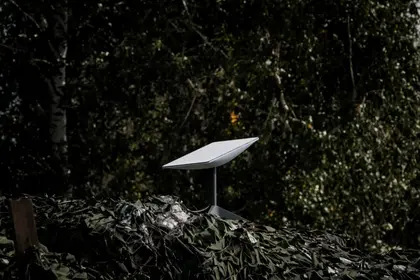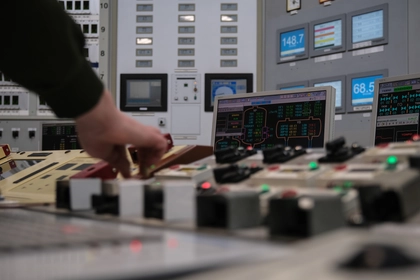Russia has been working for around a year to deploy Starlink, the satellite-internet service developed by Elon Musk’s SpaceX, on the front lines in Ukraine and started using the terminals extensively earlier this year, The Wall Street Journal (WSJ) reported.
Despite banning Starlink, Russia has seen a surge in middlemen purchasing user terminals for Russian forces. This has challenged Ukraine's technological edge, as they also rely on these advanced devices.
JOIN US ON TELEGRAM
Follow our coverage of the war on the @Kyivpost_official.
Starlink offers fast, secure internet on battlefields in Ukraine and Sudan. It solves communication challenges for troops and commanders while also controlling drones and other crucial modern warfare tech.
The Wall Street Journal tracked Starlink sales on various Russian online platforms, including links to US sellers on eBay. The WSJ investigators interviewed Russian and Sudanese middlemen, as well as followed volunteer groups delivering SpaceX hardware to the front lines.
A Moscow salesperson, who in an interview identified himself as Oleg, told WSJ that most orders were for “new territories” (Russian-occupied parts of Ukraine) or “for use by the military.” Volunteers were said to deliver the equipment to Russian soldiers in Ukraine.
Searching on the Russian search engine Yandex.ru reveals many dealers, such as Oleg, offering Starlink terminals for sale to buyers in Moscow and beyond the capital.

Russia Used Social Media to Meddle in 2024’s US Presidential Election
“Russia has worked for around a year to employ Starlink on the front, according to a person with knowledge of the situation,” the report said.
The Russians began using the terminals widely early this year after they figured out how to register the devices in other countries, the WSJ source said, without elaborating.
The widespread use of easy-to-activate Starlink hardware has drawn SpaceX into the complex geopolitics of warfare, as WSJ pointed out. SpaceX can restrict Starlink access with “geofencing,” blocking it in certain countries and locations, or by deactivating individual devices.
Russia and China prohibit Starlink due to concerns about information control and distrust of US tech. Musk stated that, to his knowledge, no terminals were sold to Russia and that they wouldn’t function within the country.
The WSJ’s investigation uncovered a clandestine supply chain for Starlink hardware, facilitating secretive deals across Africa, Southeast Asia, and the United Arab Emirates.
This has placed thousands of devices in the hands of American adversaries and alleged war criminals. Many of these users access the satellites using Starlink’s roam feature after dealers register the hardware in permissible countries.
In Russia, middlemen acquire the hardware, sometimes from eBay in the US or the black market in Central Asia, Dubai, or Southeast Asia, then smuggle it into the country.
“Russian volunteers boast openly on social media about supplying the terminals to troops. They are part of an informal effort to boost Russia’s use of Starlink in Ukraine,” the investigation reads.
At strlnk.ru, they promise “tested performance” in Crimea, Luhansk, Donetsk, and Kherson with monthly fees starting at $100. The site lists contacts for a dealer, including a Russian cellphone number and Yandex email. Despite this, the firm’s representative declined to speak with a WSJ reporter.
In Russia, many dealers openly advertise the hardware. Oleg’s employer’s website features embedded eBay listings from sellers across the globe, from Ohio to New Jersey.
When contacted, an eBay spokesperson stated the company follows laws of operating countries and international regulations. However, eBay did not comment on the US listings on Oleg’s employer’s site.
Impact on the Ukrainian front and efforts to end Russian use
A Ukrainian major, using the call sign Angel, told WSJ he first saw Russians using Starlink earlier this year as they hadn’t considered camouflaging the white antenna, which is approximately 2 feet tall and 1 foot wide.
“They’re mostly using the newer models,” he reported, highlighting that the Russian dishes are high-priority targets.
“It means there are drone operators somewhere nearby,” he added.
Ukrainian officials reached out to SpaceX regarding Russian forces using Starlink terminals in Ukraine. They are collaborating on a solution. In March, Ukraine’s telecom regulator issued a decree: Only Kyiv-registered Starlink terminals will operate in occupied areas or the front line. The timing and enforcement of these rules remain uncertain.
US Assistant Secretary of Defense for Space Policy John Plumb stated: “We’re working with Ukraine and we’re working with Starlink” to end Russian terminal use. However, SpaceX and Musk have not responded to requests for comment.
Musk, in conversation with his biographer Walter Isaacson, expressed unease about Starlink’s role in Russia’s war in Ukraine. He asked, “How am I in this war?”
In February, Ukrainian paratroopers reportedly disabled a Starlink satellite communication terminal discovered at Russian troop positions near the front.
The Airborne Assault Forces of the Armed Forces of Ukraine (AFU) stated: “The Russians have begun utilizing SpaceX’s satellite communication platforms, which has been widely discussed. However, until now, we had not been able to film them.”
Before this statement, Ukraine’s Military Intelligence (HUR) revealed the use of Starlink satellite communication systems by Russian troops in occupied Ukrainian territories.
HUR released intercepted radio communications allegedly from Russian military personnel discussing the deployment of Starlink terminals by the 83rd Airborne Assault Brigade in the Donetsk region for establishing Internet access.
In early February, Defense One media outlet reported the Russian military's commencement of using Starlink services for communication several months prior.
You can also highlight the text and press Ctrl + Enter






